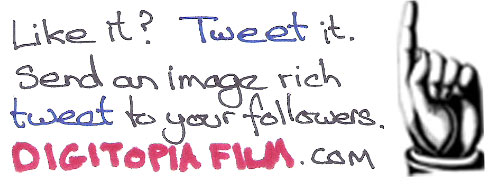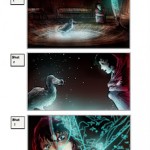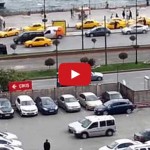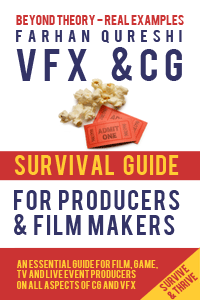As part of my collecting animation reference I filmed myself submerging a water can full of air into a water tank. As I did it the water pushed the air out of the opening making lots of large bubbles which then ripple through the water. I’ve put it in slow motion too.
The start point of any good piece of FX or animation is to get good reference footage, study the FX or animation reference and understand what it is you want to do. Much like yourself I became frustrated at the lack of good reference material on the internet, having to search for terms in youTube and then follow a trail spurious ‘similar’ videos only to find a piece of badly shot low resolution piece of reference where you barely see the thing you are after. So I’ve decided that if I see any good reference material that I will film it properly and make it freely available for you to help you when you begin a new piece of FX, animation and even crowd sim – I sure know that it would have helped me, I hope it helps you too.
I’ve also added a SLOW MOTION version (1/4 speed) here so you really analyse the flow of the water without having to step through it frame by frame
[Tweet “be a better #VFX artist – watch reference pic.twitter.com/psNhRnmHCr“]
Why is FX, animation or crowd Sim reference material so important?
I’ve done a lot of shots over my time, I know it’s all too easy to get carried away with all the controls in the software, but before you even attempt to build any type of FX, Crowd Simulation or do any animation it’s always pays you dividends to spend a few minutes studying the reference first.
For FX
- Try to think, how is this effect generated?
- Where is its emission point? – is it a single point or from a surface
- How is it being emitted? would I need to write an expression to vary the emission rate, is the emission rate noisy, random, harmonic?
- Where does the effect go?
- How does it scale – do I need to animated/write an expression on its scale attributes?
- How does it decay? It’s fine thinking about how it starts off but remember to think about how the effect should end
- How does is diffuse?
- What outside forces from the world act upon it? Gravity is the obvious one but what forces are causing changes to the effect? How would the effect be different under a set of different outside forces? For instance flags behave differently on a windy day than a calm day
For Crowd Sim
- What is the motivation of the crowd? A crowd sim in a shopping mall behaves differently to a crowd sim in a battle (unless of course it’s the start of the Christmas Sales)
- Is the crowd behaving a whole, how do members joining the crowd try to assimilate into it?
- How do members try to leave the crowd?
- How does the terrain affect the crowd?
- How does the locomotion affect the crowd? Think about the expressions you can write into the attributes of your agents
- What are the different attributes you can give to your agents, do they vary and if so by how much?
- How many different variants do you need? Are the members of the crowd actually similar?
- What is the density of the crowd?
- How many different animation cycles do you need?
For Animation
- Look for the beats in the reference, much like when you are blocking out an animation you will look for key poses do the same when looking at the reference
- Pause the video when you find those strong poses – especially for animals. For human animation you can stand up and do the pose, but for animals looks at their corresponding joints, how have they achieved that pose?
- Where are the arcs and how do they achieve those movements? You may find you need an extra rig control to achieve some of these movements
- If you’re animating a monster or some type of fantasy creature that doesn’t exist in the real world, use these references to find out what similar traits your character has with a real animal – does it move aggressively like an cat moving to its target, does it shriek like a peacock would, does dart away like a cat or a squirrel would? You can in looking through these references that I’ve provided find traits for your characters that will breath life into them.
- Study the animal’s eyes, as much as I can I’m going to try to get into positions where I can see the animal’s eyes, it’s quite likely you’ll be framing around the eye line too
Okay enough from me, I want to hear from you below. Break the reference down yourself and leave some comments below on how you would go about creating this particular piece of FX, crowd sim, animation or texture. I’m especially interested in hearing about how you would do it in different pieces of software – as you know I’m mostly a Maya and Houdini person, how does it differ in other packages – do you have any special controls or set ups that you want to tell us about. Please do leave some comments and tell other FX artists and animators about this resource, facebook like, G+ share and tweet the bird animation reference (pardon the (intended) pun).
[Tweet “be a better #VFX artist – watch reference pic.twitter.com/psNhRnmHCr“]
I’ll be adding more animation reference to this library anytime I think I can find interesting reference materials please do keep checking back. If there is a particular piece of reference you are interested in please leave a comment below and do share the content.
I’m happy for you to use this as part of your work, if you want to go further and pull some keys from the footage and use them directly that’s fine too – all I’d ask though is for credit at the end of your piece or a link back to this post. If your project is an IMDB qualifying project then do give me a credit linking back to my IMDB page http://www.imdb.com/name/nm1629604/







Leave a Reply